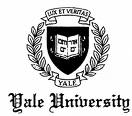There is an uncountable number of things that I could talk about in great detail from Yale's Ivy Scholars Program. However, I shall focus on two events that truly represent the essence of this amazing experience, Marshall Brief presentations and graduation dinner.
Nearly every night of our fortnight spent at Yale consisted of working for many hours with the four other members of our Marshall Brief group. Earlier in the week, we had turned in the final copy of our written brief--12pages of a proposed U.S. policy that was simultaneously detailed and concise. Friday would be spent presenting our plan through a powerpoint and our newly-refined public speaking skills to our fellow peers and a "murder" board. The murder board would consist of 2-3 judges who role-played the positions of government officials who our brief would concern in real-life. Also, the president and vice president could each walk in on our presentations at any given moment. At Ivy Scholars, Prrofessor Luong was Barack Obama and Dean Coburn-Palo was Joe Biden.
Our presentations took place from 1pm until 8:45pm. Unfortunately, my group was scheduled for 6:30pm, the second to last time slot. Looking back, however, we were lucky to have the chance to observe groups that presented before us, but we had to wear our professional outfits and control our nerves for a longer period of time. Finally, 6:30 arrived and it was my group's turn to present our brief, Preventing Afghanistan from Becoming a Failed State. Our murder board consisted of a general played by YISP mentor Ben Elkins and the Undersecretary of State played by Professor Hennigan. We gave ourselves titles as well: our group was called "The Independent Commission to Review U.S. Policy in Afghanistan" and I was the Chief Intelligence Officer.
Our presentation began and I proceeded to elaborate on my sections: the overview, the definition of a failed state, and the implications of Afghanistan becoming a failed state. Needless to say, it was extremely nerve wrecking, especially since the vice president was in the audience and the general was constantly interrupting with questions. Additionally, in the middle of my section, the classroom door opened and President Obama walked in. Everyone in the room followed presidential etiquette and stood up until the president uttered the words "as you were". I explained to him where we were in the presentation and offered him a summary of what we had already covered, but our considerate president told me that he had read our brief thoroughly and that he wanted me to proceed with the presentation. I did, then soon after I handed it over to my fellow colleagues, who elaborated n security, government, economy, infrastructure, and education. The murder board, especially the general, grilled us with many questions, but my group handled most of them like true policy experts. Finally, after an hour of standing in front of a classroom full of dignitaries and colleagues, our presentation was finished. Handshakes, high-fives, and hugs were exchanged and at that moment I felt more relaxed than ever before.
The feeling of completing the hardest part of the intense program was only equaled the next day by the excitement of graduation. All sixty-nine of us were dressed up considerably more than our usual business-casual attire. We took a myriad of pictures, for posterity and for facebook. After that, we congregated in an elegant Yale building and were served mocktails and appetizers. Before Ivy Scholars, most of us teenagers would have been ravenous at the sight of food, however Professor Luong's lecture on etiquette had trained us too proceed with caution instead. Greasy food would ruin our ability to administer acceptable handshakes and carbonated drinks would incite burps during important conversations. Instead, we exercised our Keith Ferazzi-esque skills and took part in many conversations. Soon after, dinner began. My steak was delicious and the people at my table were wonderful and entertaining. However, I think the part of our dinner that was the epitome of Ivy Scholars' effect on all of us came from the spilling of drinks. Water and juice were both accidentally spilled on our tablecloth and all eight of us watched eagerly as the spills expanded towards each other. Instead of searching for napkins, we compared the "battle" in fro went of our eyes to the Cold War and words such as "detente" were mentioned. On a more serious note, however, we were presented our graduation certificates and awards. I was ecstatic when my Marshall Brief group received the award for best overall Marshall brief. We received signed copies of Professor Kennedy's book Parliament of Man and a feeling of immense satisfaction. Lastly, Dean Nick-Coburn Palo and Professor Luong shared some closing remarks with us.
I'll share videos of these speeches and pictures from these events as soon as I remove the malware or virus on my computer that is preventing me from doing so. Also, I'll make another post of my reflections of the entire program soon. I need to go to sleep right now, however, because I have Marching Band camp in a few hours. Thank you for reading this!
Wednesday, August 12, 2009
Subscribe to:
Post Comments (Atom)





Yohanna,
ReplyDeleteThe whole premise of your Marshall Brief is interesting not only in the topic but in the parameters.
For instance, your topic referred to a ‘failed state’ but requires a definition of “failed”. Depending on the administration and their own long term political and historic goals, that definition could vary wildly. Compare the definition of “failed” between that of the US administration and the people of Afghanistan.
As you learned the hard way, when some people get to a particular level of power and authority, they tend to forget the manners their mothers taught them and feel that they can interrupt or distract the presenter whenever they want to. Generals and Admirals, in particular, are especially prone to such actions.
Thanks so much for sharing this part of the experience with us.